Superba Krill delivers a natural composition of essential nutrients—omega-3 EPA & DHA, choline, and astaxanthin— supporting cellular function and overall health.
Its unique phospholipid composition aligns with the structure of our cells, ensuring efficient nutrient absorption and integration into cells and tissues, promoting optimal organ and whole-body health.
Derived from abundant species with a stable biomass, Superba krill stands out due to its exceptional composition and easy absorption by our cells. In this article, we will explore the seven key advantages of krill oil that make it an essential addition to your daily wellness routine:
1. Abundant species with a stable biomass
2. Sustainable and precautionary fishery
3. Omega-3s in a unique multi-nutrient composition
4. Omega-3s in the exact form our cells need allows for easy absorption, incorporation and digestion of essential nutrients
5. Unmatched purity, freshness and quality
6. Multiple health benefits
7. Resilient supply chain providing security and stability of supply at stable prices
Abundant species
Krill oil comes from one of the most abundant species on Earth with a healthy and stable biomass, documented by science1, making it an ideal source for meeting omega-3 needs without depleting marine sources.

Sustainable and precautionary fishery
The Antarctic krill fishery is likely the most precautionary and sustainable fishery in the world due to its low catch ratios and unique harvesting methods ensuring minimal unwanted catch. With only 1% of the total krill population fished compared to well over 20% in some fisheries, krill fishing stands out as an environmentally responsible choice ensuring stable and sufficient supply of essential human health ingredients whilst protecting the ecosystem that we operate in.
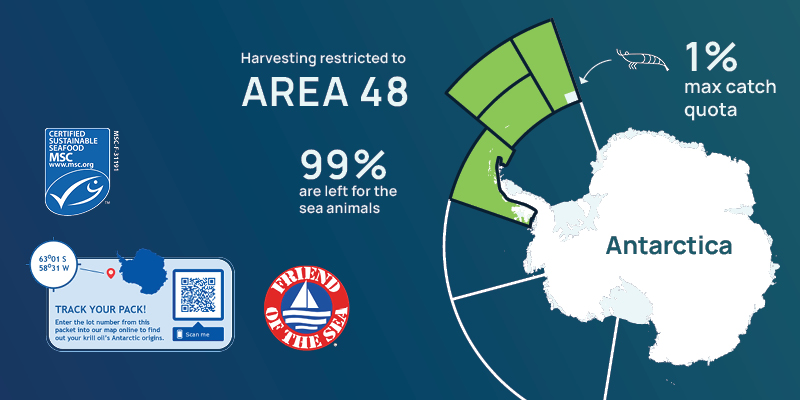
The krill fishery operates under strict regulations set forth by CCAMLR (Commission For Conservation Of Antarctic Marine Living Resources), ensuring minimal environmental impact on the Antarctic ecosystem while maintaining healthy stock levels. Reputable certifications like Marine Stewardship Council (MSC) and Friends of the Sea endorse the Aker BioMarine krill fishery, and the fishery is also top rated by Sustainable Fisheries Partnership.
Omega-3s in a unique multi-nutrient composition
What makes krill oil truly unique is its natural multi-nutrient composition. Besides offering high-quality omega-3 EPA/DHA content crucial for heart health, brain function, joint support, and more; krill oil also provides phospholipids and choline, which are crucial for cellular function, along with the naturally occurring antioxidant astaxanthin which gives color to the oil, keeping the oil fresh and eliminates the need for additives or preservatives.
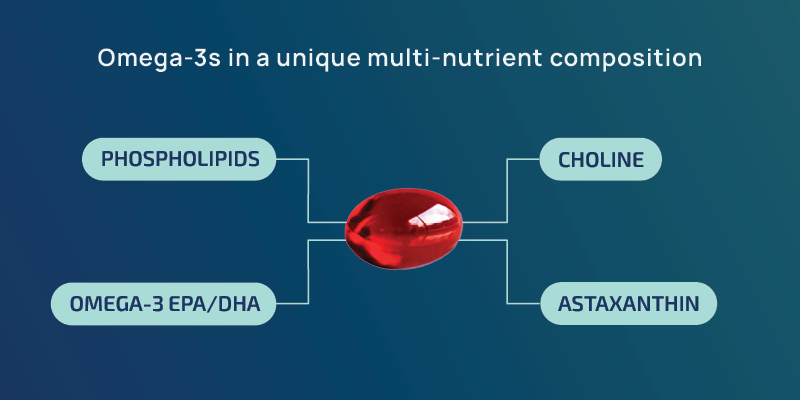
Omega-3s in the exact form our cells need allows for easy absorption, incorporation and digestion of essential nutrients
One key advantage of krill oil lies in its phospholipid form. Phospholipids are an integral part of our cell membranes influencing cellular structure and function. Since our body’s cells contain phospholipids, phospholipid-bound omega-3s allow for easy absorption and incorporation of nutrients into tissues2 resulting in enhanced utilization and overall health benefits supporting optimal well-being.
Phospholipid-bound omega-3s from krill work on a cellular level, contributing to cell membrane integrity and improved structure, which, in turn, enables those cells to deliver more omega-3 health benefits throughout the body.
Unlike forms that are oil based and require conversion within our bodies, krill phospholipids are both oil and water based making it easy to digest without the unpleasant aftertaste.
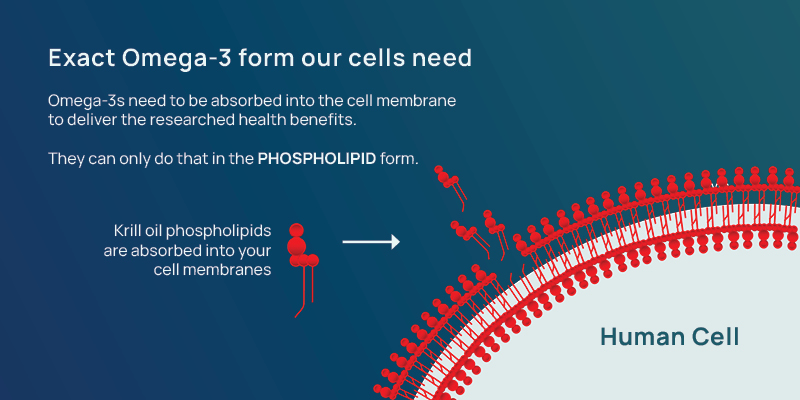
Unmatched purity, freshness and quality
Sourced exclusively from fresh Antarctic krill through sustainable practices, our Superba KrillR Oil offers unparalleled purity without any further processing or molecular modifications. The naturally occurring antioxidant astaxanthin gives color to the oil, keeping the oil fresh and protects it from oxidation, eliminating the need for additives or preservatives.
Gentle extraction methods are being used to preserve freshness, maximize organoleptic properties, and maintain high levels of nutrients while meeting stringent quality standards. The result is a clean, natural and minimally processed product free from additives or preservatives or any unwanted substances while maintaining exceptional taste and freshness throughout consumption.
Aker BioMarine Houston lab performs approximately 12 different analyses on every krill oil batch before release to ensure nutrient value and concentration of nutrient levels, level of freshness, and to ensure no bacterias, pollutants etc. To analyse the level of freshness, oxidation and rancidity in the oil, the peroxide value (the primary oxidation product) is measured. In fish oil, total TOTOX value is often measured as a indication of oxidation, however, due to the phospholipids and the astaxanthin levels, TOTOX oxidation is not possible to capture/measure in krill oil.
Analysis show that the peroxide value in krill oil is consistently low and Superba Krill is characterized by a clear ruby red colour and fresh smell and odour. Moreover, Superba Krill oil is documented free of environmental toxins and unwanted substances as well as documented free of micro plastic. Finally, Superba Krill undergoes several stability studies before it reaches customers all over the world.
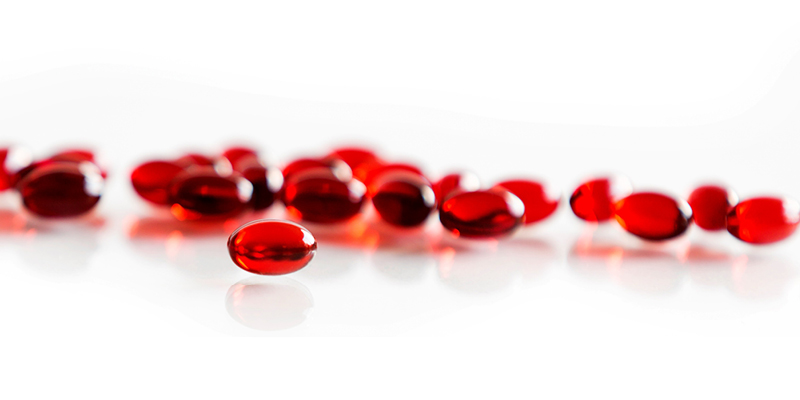
More than 50 studies on krill oil and its benefits for human health to date
Decades-worth of scientific research has been conducted on krill oil and its effects on the human body. These studies have investigated whether krill oil can make a beneficial impact on human health due to its unique phospholipid-bound omega-3s.
Over 50 studies have been conducted on krill oil and these studies have consistently supported the positive health effects of krill oil across a range of health areas. These significant results include lowered triglyceride levels (without increasing LDL cholesterol) for better heart health; reduced knee pain and stiffness for sufferers of osteoarthritis; less fat accumulation in the liver for better overall liver function; faster recovery and better muscle function for athletes post-workout; and even improved skin, PMS symptom relief and cognitive function.
Krill oil’s key constituents – EPA/DHA & choline - are supported by four authorized EU health claims related to heart and liver health. In addition, approved health claims in Canada, Australia, South Korea and Japan, all reaffirm krill oil’s health benefits as a unique nutrient-packed omega-3 source.
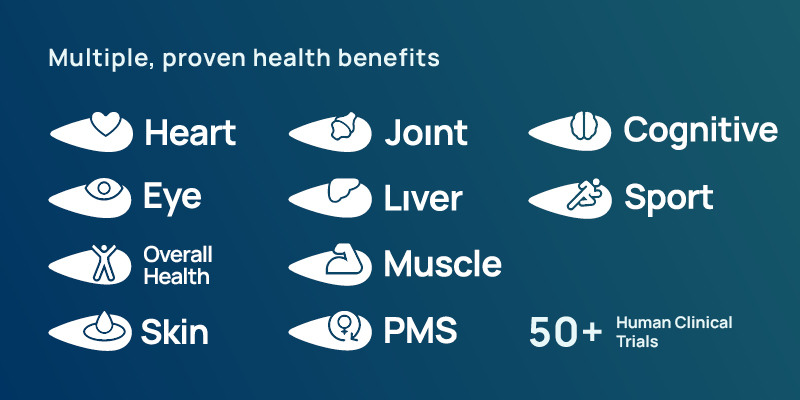
Security and stability of supply
Another key advantage of choosing krill oil is its transparent and resilient supply chain which guarantees reliable availability at stable prices. Aker BioMarine’s krill value chain offers full transparency and control from harvesting to production to final product, securing continuity of supply at stable prices.
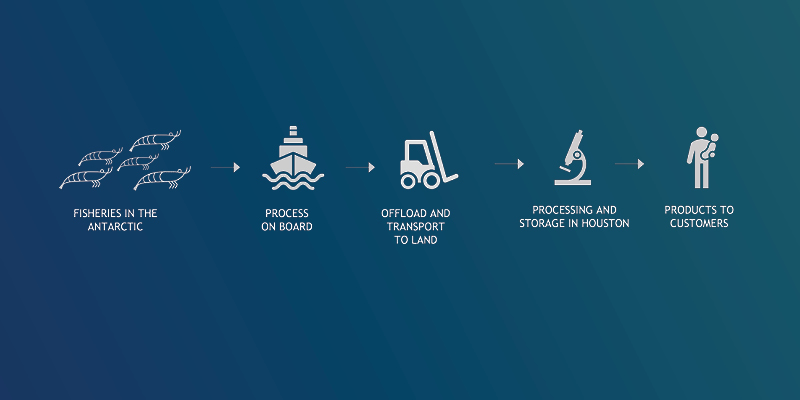
This means that our customers can trace every batch of krill from exact harvesting position, providing their consumers again with a product that is 100% traceable back to its origin.
The case for krill oil
Krill oil offers unparalleled advantages as a natural multi-nutrient supplement derived from sustainable sources with guaranteed purity and quality control measures throughout its extraction process.
With its unique composition tailored specifically for easy absorption by our cells' membranes combined with multiple scientifically-proven health benefits supported by extensive clinical trials, krilI oil emerges as an ideal choice to unlock optimal well-being at the cellular level.
Incorporating krill oiI into your daily routine can help support heart health, brain function, joint mobility, muscle strength, support healthy aging, and more.
Choose nature's powerhouse - choose krilI oiI!
References
1. G, Skaret.; G, J, Macaulay.; R, Pedersen.; et al. (2023). Distribution and biomass estimation of Antarctic krill (Euphausia superba) off the South Orkney Islands during 2011–2020, ICES Journal of Marine Science, Volume 80, Issue 5, Pages 1472–1486.
Additional References
2. Krill oil absorption studies
Ulven, S.M.; Kirkhus, B.; Lamglait, A.; et al. (2011). Metabolic Effects of Krill Oil are Essentially Similar to Those of Fish Oil but at Lower Dose of EPA and DHA, in Healthy Volunteers. Lipids 46, 37–46 (2011).
Schuchardt, J. P.; Schneider, I.; Meyer, H.; et al. (2011). Incorporation of EPA and DHA into plasma phospholipids in response to different omega-3 fatty acid formulations--a comparative bioavailability study of fish oil vs. krill oil. Lipids in health and disease, 10, 145.
Ramprasath, V. R.; Eyal, I.; Zchut, S.; et al. (2013). Enhanced increase of omega-3 index in healthy individuals with response to 4-week n-3 fatty acid supplementation from krill oil versus fish oil. Lipids in health and disease, 12, 178.
Köhler, A.; Sarkkinen, E.; Tapola, N.; et al. Bioavailability of fatty acids from krill oil, krill meal and fish oil in healthy subjects–a randomized, single-dose, cross-over trial. Lipids Health Dis 14, 19 (2015).
Ramprasath, V. R.; Eyal, I.; Zchut, S.; et al. (2015). Supplementation of krill oil with high phospholipid content increases sum of EPA and DHA in erythrocytes compared with low phospholipid krill oil. Lipids in health and disease, 14, 142.
Sung, H. H.; Sinclair, A. J.; Lewandowski, P. A.; et al. (2018). Postprandial long-chain n-3 polyunsaturated fatty acid response to krill oil and fish oil consumption in healthy women: a randomised controlled, single-dose, crossover study. Asia Pac J Clin Nutr 2018;27(1):148-157.
Yurko-Mauro, K.; Kralovec, J.; Bailey-Hall, E.; et al. (2015). Similar eicosapentaenoic acid and docosahexaenoic acid plasma levels achieved with fish oil or krill oil in a randomized double-blind four-week bioavailability study. Lipids in health and disease, 14, 99.
3. Krill oil Heart studies
Mozaffarian, D.; Maki, K. C.; Bays, H. E.; et al. (2022). Effectiveness of a Novel ω-3 Krill Oil Agent in Patients With Severe Hypertriglyceridemia: A Randomized Clinical Trial. JAMA network open, 5(1), e2141898.
Rundblad, A.; Holven, K. B.; Bruheim, I.; et al. (2018). Effects of krill oil and lean and fatty fish on cardiovascular risk markers: a randomised controlled trial. Journal of nutritional science, 7, e3.
Cicero, A. F.; Rosticci, M.; Morbini, M.; et al. (2016). Lipid-lowering and anti-inflammatory effects of omega 3 ethyl esters and krill oil: a randomized, cross-over, clinical trial. Archives of medical science : AMS, 12(3), 507–512.
Lobraico, J. M.; DiLello, L. C.; Butler, A. D.; et al. 2015). Effects of krill oil on endothelial function and other cardiovascular risk factors in participants with type 2 diabetes, a randomized controlled trial. BMJ open diabetes research & care, 3(1), e000107.
Berge, K.; Musa-Veloso, K.; Harwood, M.; et al. (2014). Krill oil supplementation lowers serum triglycerides without increasing low-density lipoprotein cholesterol in adults with borderline high or high triglyceride levels. Nutrition research (New York, N.Y.), 34(2), 126–133.
Banni, S.; Carta, G.; Murru, E.; et al. (2011). Krill oil significantly decreases 2-arachidonoylglycerol plasma levels in obese subjects. Nutrition & metabolism, 8(1), 7.
Berge, R. K.; Ramsvik, M. S.; Bohov, P.; et al. (2015). Krill oil reduces plasma triacylglycerol level and improves related lipoprotein particle concentration, fatty acid composition and redox status in healthy young adults - a pilot study. Lipids in health and disease, 14, 163.
Bunea, R.; El Farrah, K.; & Deutsch, L. (2004). Evaluation of the effects of Neptune Krill Oil on the clinical course of hyperlipidemia. Alternative medicine review : a journal of clinical therapeutic, 9(4), 420–428.
4. Krill oil Joint studies
Stonehouse, W.; Benassi-Evans, B.; Bednarz, J.; et al. (2022). Krill oil improved osteoarthritic knee pain in adults with mild to moderate knee osteoarthritis: a 6-month multicenter, randomized, double-blind, placebo-controlled trial. The American journal of clinical nutrition, 116(3), 672–685.
Suzuki, Y.; Fukushima, M.; Sakuraba, K.; et al. (2016). Krill Oil Improves Mild Knee Joint Pain: A Randomized Control Trial. PloS one, 11(10), e0162769.
Deutsch L. (2007). Evaluation of the effect of Neptune Krill Oil on chronic inflammation and arthritic symptoms. Journal of the American College of Nutrition, 26(1), 39–48.
5. Krill oil Cognitive health and healthy aging
SenGupta, T.; Lefol, Y.; Lirussi, L.; et al. (2022). Krill oil protects dopaminergic neurons from age-related degeneration through temporal transcriptome rewiring and suppression of several hallmarks of aging. Aging, 14(21), 8661–8687.
Konagai, C.; Yanagimoto, K.; Hayamizu, K.; et al. (2013). Effects of krill oil containing n-3 polyunsaturated fatty acids in phospholipid form on human brain function: a randomized controlled trial in healthy elderly volunteers. Clinical interventions in aging, 8, 1247–1257.
6. Krill oil Muscle health
Alkhedhairi, S. A.; Aba Alkhayl, F. F.; Ismail, A. D.; et al. (2022) The effect of krill oil supplementation on skeletal muscle function and size in older adults: A randomised controlled trial. Clinical nutrition (Edinburgh, Scotland), 41(6), 1228–1235.
7. Krill oil Dry eye
Deinema, L. A.; Vingrys, A. J.; Wong, C. Y.; et al. (2017). A Randomized, Double-Masked, Placebo-Controlled Clinical Trial of Two Forms of Omega-3 Supplements for Treating Dry Eye Disease. Ophthalmology, 124(1), 43–52.

